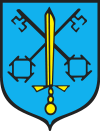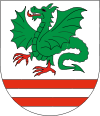Łaskarzew
| Łaskarzew | ||
|---|---|---|
| ||
 Łaskarzew | ||
| Coordinates: 51°47′24″N 21°35′33″E / 51.79000°N 21.59250°E | ||
| Country |
| |
| Voivodeship | Masovian | |
| County | Garwolin | |
| Gmina | Łaskarzew (urban gmina) | |
| Town rights | 1418 | |
| Government | ||
| • Mayor | Lidia Sopel Sereja | |
| Population (2006) | ||
| • Total | 4,908 | |
| Time zone | CET (UTC+1) | |
| • Summer (DST) | CEST (UTC+2) | |
| Postal code | 08-450 | |
| Area code(s) | +48 25 | |
| Car plates | WG | |
| Website | http://www.miasto.laskarzew.pl | |
Łaskarzew [wasˈkaʐɛf] is a town in Garwolin County (15 kilometres (9 miles) from Garwolin), Masovian Voivodeship, Poland, with 4,948 inhabitants (2004). It is located on the Promnik river, which is a tributary of the Vistula, near the Garwolin Forests, on the border of historic Polish provinces of Lesser Poland and Mazovia.
The origins of the town date back to 1418. At that time, on the left bank of the Promnik was a village called Gorczycew, located in the corner of Lesser Poland’s Sandomierz Voivodeship (the Promnik marks the border between Lesser Poland and Mazovia). Upon request of Bishop of Poznań, Andrzej Łaskary Gosławicki, King Władysław Jagiełło agreed to locate the newly established town of Łaskarzew (named in honor of the bishop) on the right, Mazovian bank of the Promnik. The bishop favored this location, as the new town belonged to his diocese, not the Diocese of Kraków. Currently Łaskarzew lies on both sides of the river, and the district on the left, Lesser Polish bank, is still called Gorczycew.
In 1514, another Bishop of Poznań, Jan Lubrański, decided to expand the town, and allowed local residents to cut down a forest near the village of Pilczyn, creating New Łaskarzew (Nowy Łaskarzew). In the 17th century, the town had two mills, and 100 years later, in 1764, a wooden town hall was erected. Łaskarzew also had a hospital (since the 15th century), and a school, since 1629. It also was a local center of brewing and liquor industry, there also were market days, which attracted local inhabitants and merchants.
Łaskarzew was stripped of its town rights by Russian authorities after the January Uprising, and remained a village until the 1920s, when it already belonged to the Second Polish Republic. During the Polish September Campaign, Laskarzew was defended from Sept. 15 to Sept 17., and during the fighting, almost whole town was burned. Later on, Łaskarzew was a center of Polish resistance. Here, Polish and Soviet units concentrated in the summer of 1944 for the Vistula river crossing.
Among points of interest there are Holy Cross Church (1884), destroyed during World War II, and rebuilt in 1946, and cemetery chapel from 1847. The town has had a rail station since 1877. European route E372 goes 11 km (7 mi) from Łaskarzew.
Coordinates: 51°48′N 21°36′E / 51.800°N 21.600°E
Massacre during Second World War
During the German Invasion of Poland in 1939, German forces on 17 September murdered 54 people in the town, including 34 Jews and 24 Poles. The victims included elderly people as old as 75 years.[1] On September 27, 1942, German forces deported 1,240 Jews to Treblinka extermination camp.[2]
External links
- Jewish Community in Łaskarzew on Virtual Shtetl

